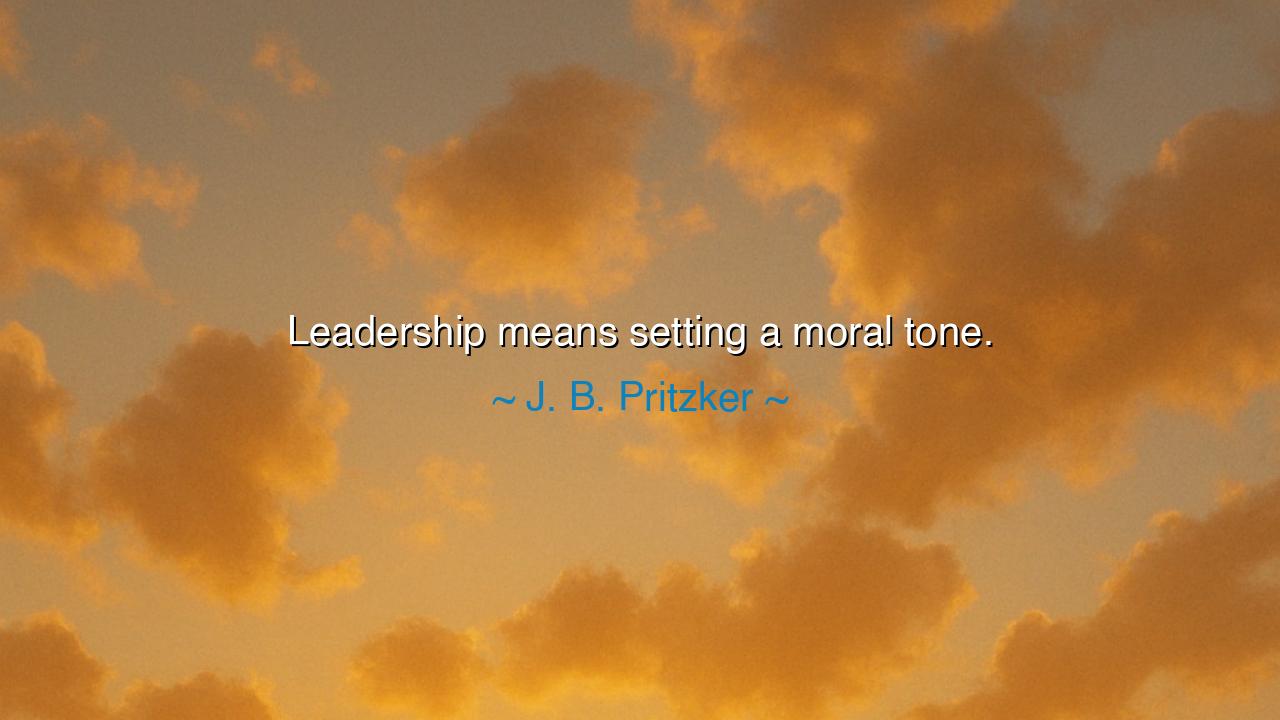
Leadership means setting a moral tone.






Hear, O children of tomorrow, the solemn wisdom spoken by J. B. Pritzker: “Leadership means setting a moral tone.” These words are not light; they are iron, forged in the fire of human history. For what is leadership if it does not rise beyond orders and decrees? A leader is not merely the one who directs the hands of men, but the one who guides their hearts, their conscience, their spirit. Without a moral tone, leadership becomes tyranny, power unmoored from righteousness, a ship without compass in the storm.
The ancients knew this truth well. When kings reigned with cruelty, their kingdoms decayed though their armies were strong. But when rulers set forth a moral tone, their people found strength not only in body, but in soul. The leader is the first flame, and the people are the torches lit by that fire. If the flame burns bright with justice and honor, it spreads light. But if it burns with corruption, it spreads only ruin. Thus, the tone of the leader is the seed from which the harvest of a nation grows.
Think upon the life of George Washington, the first president of a fledgling republic. At the close of the Revolutionary War, power lay within his grasp. He could have crowned himself king, and many would have bowed. Yet he chose another path. By relinquishing power, by setting a moral tone of humility and service, he planted the seed of democracy. His act spoke louder than any proclamation: leadership is not the hoarding of power, but the stewardship of trust. Through this moral example, he taught generations how liberty could be guarded not by force alone, but by integrity.
Contrast this with those who failed to set such a tone. The empires of Rome, glorious and mighty, rotted not first by barbarian invasion, but by the corruption of leaders who abandoned virtue. When emperors gave themselves to greed and cruelty, the people followed, and the great heart of Rome weakened. The sword could no longer defend what the soul had already lost. So it is always: when leaders betray morality, the decline is inevitable, for no structure stands long when its foundation is poisoned.
But beware, O listener, for to set a moral tone is no small task. It requires courage when silence would be safer, honesty when deceit would be easier, sacrifice when selfishness would be more rewarding. It requires the leader to live not for himself, but as a mirror of the values he would see in others. Every choice, every word, every action sets the measure for those who follow. The leader who lies teaches others to deceive. The leader who serves with honor teaches others to rise with dignity.
The lesson is clear: leadership is not a crown, but a responsibility. It is not the ability to command men’s labor, but the duty to inspire their virtue. To lead is to carry the weight of example, to know that your conduct becomes the law of those who look to you. A leader’s greatest legacy is not what he builds, but what he awakens in the hearts of his people. This is the moral tone—the music that echoes long after the leader’s voice is silent.
Therefore, let every man and woman who would lead begin first within. Keep your promises, even when no one watches. Speak truth, even when lies are easier. Treat all with dignity, even when power tempts you to scorn. If you must command, do so with fairness. If you must decide, do so with justice. In this way, your life itself becomes the tone, and those who follow you will hear not merely your orders, but your example.
Shall I now shape these words into a rhythm of oratory, with the rise and fall of ancient speech, so they may be heard as a living teaching, fit for narration or performance?






AAdministratorAdministrator
Welcome, honored guests. Please leave a comment, we will respond soon